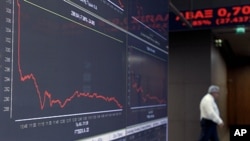With 24 hours to go before another summit, European leaders were scrambling Tuesday to complete a plan to resolve the continent's governmental debt contagion.
The outline of a package of reforms is emerging, but details have yet to be set. The plan calls for European banks to forgive billions of dollars of debt for Greece and sharply increase their own cash reserves. At the same time, the size of the continent's bailout fund would be boosted to assist other debt-ridden countries in the future.
The European heads of state have promised a debt-relief plan by Wednesday when they meet in Brussels for their second summit in four days to try to resolve the two-year-old crisis.
World financial markets have been roiled in recent weeks as the continent's officials have moved slowly in their efforts to keep Greece from defaulting on its international obligations. The European leaders are also trying to keep the debt crisis from spreading to bigger economies in Italy and Spain, and sending world economies into a tailspin.
Greek Prime Minister George Papandreou called the impending decisions "a critical time," requiring European leaders to "remain clear-headed and calm."
Reaching agreement on the plan has proved difficult.
European leaders want banks holding Greek debt to write off as much as 60 percent of the money they are owed, nearly three times the amount they agreed to in July when Greece's second bailout in two years was approved. The banks, however, are only offering to assume losses of 40 percent. A middle-ground 50 percent loss would amount to about $243 billion.
While agreeing to bigger losses, the banks would also be required to increase their cash reserves next year by about $139 billion. But the exact timing of the requirement remains in question.
The European leaders are also calling for an increase in the $596 billion bailout fund for the bloc of 17 nations that use the common euro currency. It could be increased to nearly $1.4 trillion, without requiring European governments to provide more money. Instead, they hope to craft a plan to insure against possible future losses in hopes of attracting new capital from private investors and countries like China that have cash to invest.
While the immediate focus has been on debt-ridden Greece, German Chancellor Angela Merkel and French President Nicolas Sarkozy are pressing Italian Prime Minister Silvio Berlusconi to move faster to adopt new economic reforms to stave off the need for an Italian bailout.
Berlusconi has started emergency negotiations to try to raise Italy's retirement age from 65 to 67, but so far has been unable to convince his Northern League political partner to go along with the change.
Some information for this report was provided by AP, AFP and Reuters.













